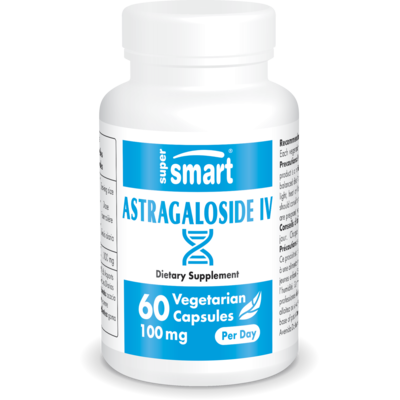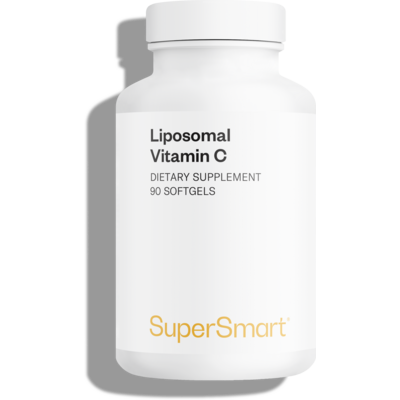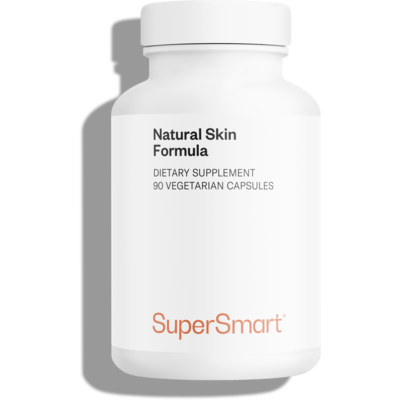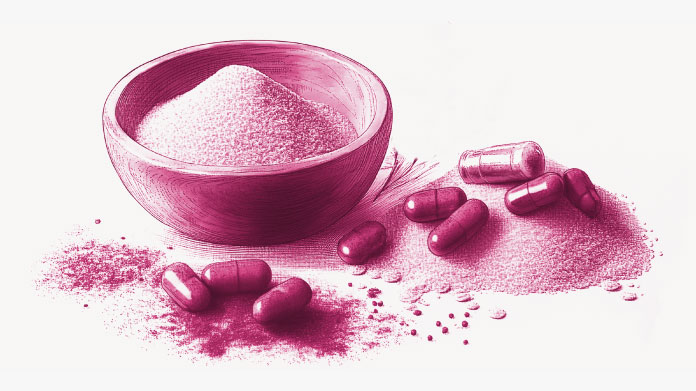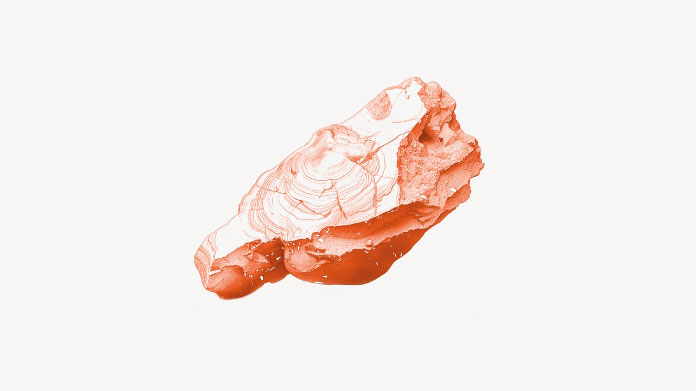Sagging skin: which supplement should you take?
If you hanker after the firm, toned skin of your youth, discover the best supplements for helping to combat sagging skin.
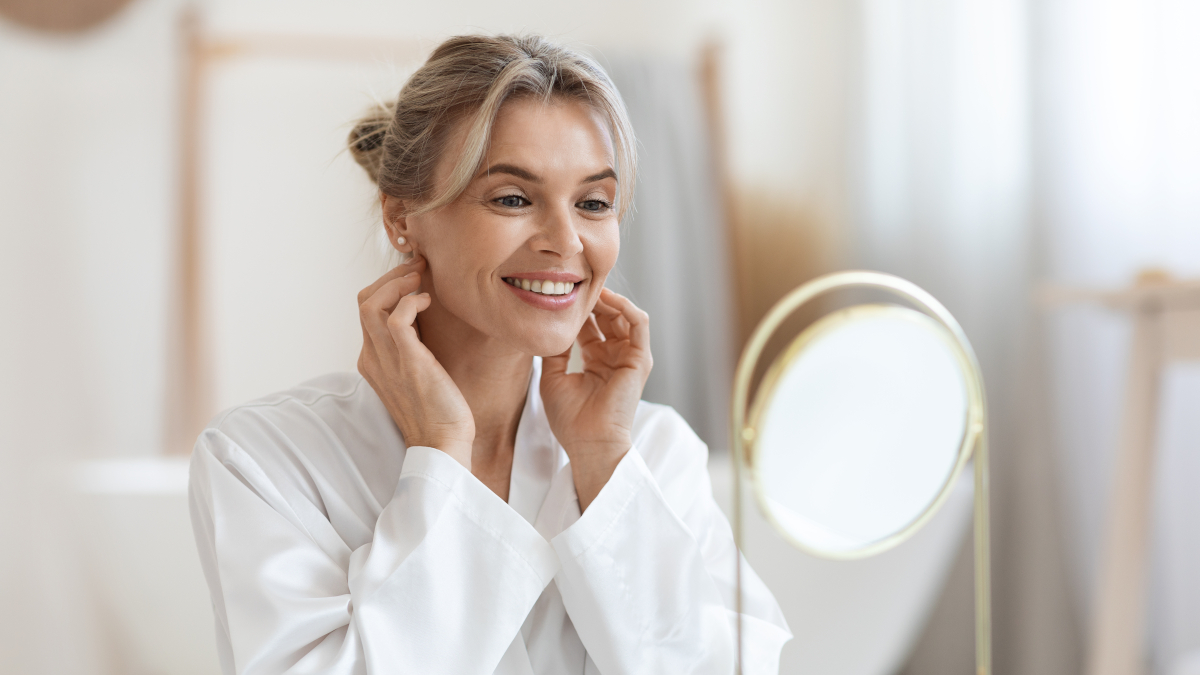
Why does skin start to sag with age?
Several factors intrinsically linked to aging are responsible for sagging skin.
Firstly, age brings a loss of bone support which weakens the contours of the face. Under the effect of gravity, tissue starts to droop, the effects of which are particularly visible around the jawbone, temples and cheekbones.
At the same time, there’s a decline in the production of hyaluronic acid, collagen , and elastin, substances present in the extracellular matrix which play a key structural role within the dermis. Reduced elasticity means the skin is less able to ‘snap back into shape’: it appears looser and more distended, which also results in the appearance of the first fine lines and wrinkles (often from the thirties onwards) (1).
In women, the fall in estrogen levels that comes with menopause also precipitates sagging skin, as estrogen is a natural stimulant of collagen and elastin production (2). Smoking and lifelong exposure to the sun and environmental pollutants also exacerbate the process (3-4).
Note too, that people who have lost a lot of weight are more prone to sagging skin: when overstretched for a long period by adipose tissue, the skin loses the ability to return to its original shape (5).
What should you eat to help firm up your skin?
Toning the skin starts with eating the right foods! The first strategy is to increase your intake of collagen. The problem here is that dietary sources are rare – and those foods that do contain it are not always that popular, top collagen-containing foods being bone broth, bone marrow, and gelatine (6).
Another option is to focus on the nutrients involved in collagen production or foods containing antioxidants which protect the skin from cell damage. Here, it’s important to eat plenty of colorful fruits and vegetables, boost your intake of zinc which helps maintain normal skin (seafood, cheese, cocoa …), and ensure your selenium needs are met as it helps protect cells against oxidative damage (fish, poultry, Brazil nuts ...) (7-9).
And don’t forget about essential fatty acids, especially omega-3 from oily fish or walnuts (10).
Make sure too that you stay well-hydrated (drink 1.5-2 liters of water a day) and limit your alcohol consumption as it encourages dehydration and skin aging (11).
What’s the best dietary supplement for countering sagging skin?
Any supplement formulated to combat saggy skin should ideally include the following five substances at least.
Collagen
Collagen is the most abundant protein in the human body, representing 25%-30% of total protein mass (12). Present in various forms in almost all structures in the body, it is primarily type I collagen, produced by specialist cells called fibroblasts, which is found in the skin. Forming a framework within the skin, structural collagen fibers ensure strength and tone of tissues, effectively preventing the formation of wrinkles (13).
Biotin
Often referred to as the ‘beauty vitamin’, biotin is known by various names: vitamin B8, vitamin B7 or vitamin H. It helps maintain healthy skin by supporting the metabolism of macronutrients (especially proteins, the amino acids of which will be used to produce structural proteins of the skin) (14). A veritable ally of beautiful skin and enemy of dull complexions and small imperfections!
Hyaluronic acid
Hyaluronic acid is a compound naturally present in the body, especially the dermis. Its use in anti-aging creams and cosmetic treatments has risen exponentially in recent years. Due to its excellent tolerability, it remains the gold standard ingredient for adding volume and reducing wrinkles (15). Its ability to plump up the skin comes from its dual action of filling the empty spaces between cells and increasing water retention within tissues (16).
Ceramides
Ceramides fulfill a very specific function within the epidermis: they act as a ‘cement’ in the hydrolipidic barrier, which is responsible for maintaining both the skin’s integrity in the face of external aggressors (especially UV rays) as well as its hydration (17). This gives the skin more luminosity, softness and plumpness.
Elastin
Collagen’s partner, elastin also helps support skin tissues, though in a different way. While collagen provides cohesion, elastin gives skin its elasticity (18), enabling it, for example, to return to its original shape after being stretched, and maintaining its smooth, firm, supple appearance.
It’s precisely for all these reasons that the synergistic formulation Natural Skin Formula combines these 5 mainstays of healthy-looking skin.
Bonus: other supplements for more mature skin
An anti-skin aging vitamin: does it exist?
There is certainly no miracle vitamin capable of stopping the aging process in its tracks (more’s the pity). However, vitamin C plays a role in the formation of collagen for normal skin function (19). It also helps protect cells from the effects of oxidative stress, making it doubly effective at fighting the ravages of time (20).
So in terms of diet, focus on citrus fruit, kiwi fruit, peppers, acerola cherries and raw broccoli. There are also vitamin C supplements offering maximum absorption (such as Liposomal Vitamin C with encapsulation technology that prevents the vitamin being destroyed by gastric juices) (21).
An effective anti-aging supplement
Have you heard of astragalus? Used in traditional Chinese medicine for thousands of years, this herbaceous perennial from the Fabaceae family supports skin rejuvenation. This remarkable property is the result of the plant’s astragaloside IV content, a saponoside that some studies have shown prevents UV-induced decreases in collagen synthesis (22).
Supplementing with astragaloside IV (for example, the standardized extract Astragaloside IV 98%) would therefore seem to offer particular promise in protecting skin from photoaging.
SuperSmart ADVICE
References
- Chaudhary M, Khan A, Gupta M. Skin Ageing: Pathophysiology and Current Market Treatment Approaches. Curr Aging Sci. 2020;13(1):22-30. doi: 10.2174/1567205016666190809161115. PMID: 31530270; PMCID: PMC7403684.
- Stevenson S, Thornton J. Effect of estrogens on skin aging and the potential role of SERMs. Clin Interv Aging. 2007;2(3):283-97. doi: 10.2147/cia.s798. PMID: 18044179; PMCID: PMC2685269.
- Yazdanparast T, Hassanzadeh H, Nasrollahi SA, Seyedmehdi SM, Jamaati H, Naimian A, Karimi M, Roozbahani R, Firooz A. Cigarettes Smoking and Skin: A Comparison Study of the Biophysical Properties of Skin in Smokers and Non-Smokers. Tanaffos. 2019 Feb;18(2):163-168. PMID: 32440305; PMCID: PMC7230126.
- Gromkowska-Kępka KJ, Puścion-Jakubik A, Markiewicz-Żukowska R, Socha K. The impact of ultraviolet radiation on skin photoaging - review of in vitro studies. J Cosmet Dermatol. 2021 Nov;20(11):3427-3431. doi: 10.1111/jocd.14033. Epub 2021 Mar 13. PMID: 33655657; PMCID: PMC8597149.
- Elander A, Biörserud C, Staalesen T, Ockell J, Fagevik Olsén M. Aspects of excess skin in obesity, after weight loss, after body contouring surgery and in a reference population. Surg Obes Relat Dis. 2019 Feb;15(2):305-311. doi: 10.1016/j.soard.2018.10.032. Epub 2018 Nov 5. PMID: 30638792.
- Liu D, Nikoo M, Boran G, Zhou P, Regenstein JM. Collagen and gelatin. Annu Rev Food Sci Technol. 2015;6:527-57. doi: 10.1146/annurev-food-031414-111800. Epub 2015 Mar 23. PMID: 25884286.
- Schagen SK, Zampeli VA, Makrantonaki E, Zouboulis CC. Discovering the link between nutrition and skin aging. 2012 Jul 1;4(3):298-307. doi: 10.4161/derm.22876. PMID: 23467449; PMCID: PMC3583891.
- Gupta M, Mahajan VK, Mehta KS, Chauhan PS. Zinc therapy in dermatology: a review. Dermatol Res Pract. 2014;2014:709152. doi: 10.1155/2014/709152. Epub 2014 Jul 10. PMID: 25120566; PMCID: PMC4120804.
- Bjørklund G, Shanaida M, Lysiuk R, Antonyak H, Klishch I, Shanaida V, Peana M. Selenium: An Antioxidant with a Critical Role in Anti-Aging. 2022 Oct 5;27(19):6613. doi: 10.3390/molecules27196613. PMID: 36235150; PMCID: PMC9570904.
- Madison AA, Belury MA, Andridge R, Renna ME, Rosie Shrout M, Malarkey WB, Lin J, Epel ES, Kiecolt-Glaser JK. Omega-3 supplementation and stress reactivity of cellular aging biomarkers: an ancillary substudy of a randomized, controlled trial in midlife adults. Mol Psychiatry. 2021 Jul;26(7):3034-3042. doi: 10.1038/s41380-021-01077-2. Epub 2021 Apr 20. PMID: 33875799; PMCID: PMC8510994.
- Goodman GD, Kaufman J, Day D, Weiss R, Kawata AK, Garcia JK, Santangelo S, Gallagher CJ. Impact of Smoking and Alcohol Use on Facial Aging in Women: Results of a Large Multinational, Multiracial, Cross-sectional Survey. J Clin Aesthet Dermatol. 2019 Aug;12(8):28-39. Epub 2019 Aug 1. PMID: 31531169; PMCID: PMC6715121.
- Shenoy M, Abdul NS, Qamar Z, Bahri BMA, Al Ghalayini KZK, Kakti A. Collagen Structure, Synthesis, and Its Applications: A Systematic Review. 2022 May 9;14(5):e24856. doi: 10.7759/cureus.24856. PMID: 35702467; PMCID: PMC9177216.
- Bolke L, Schlippe G, Gerß J, Voss W. A Collagen Supplement Improves Skin Hydration, Elasticity, Roughness, and Density: Results of a Randomized, Placebo-Controlled, Blind Study. Nutrients. 2019 Oct 17;11(10):2494. doi: 10.3390/nu11102494. PMID: 31627309; PMCID: PMC6835901.
- Lipner SR. Update on Biotin Therapy in Dermatology: Time for a Change. J Drugs Dermatol. 2020 Dec 1;19(12):1264-1265. doi: 10.36849/JDD.2020.4946. PMID: 33346513.
- Walker K, Basehore BM, Goyal A, et al. Hyaluronic Acid. [Updated 2023 Mar 7]. In: StatPearls [Internet]. Treasure Island (FL): StatPearls Publishing; 2023 Jan-. Available from: https://www.ncbi.nlm.nih.gov/books/NBK482440/
- Draelos ZD, Diaz I, Namkoong J, Wu J, Boyd T. Efficacy Evaluation of a Topical Hyaluronic Acid Serum in Facial Photoaging. Dermatol Ther (Heidelb). 2021 Aug;11(4):1385-1394. doi: 10.1007/s13555-021-00566-0. Epub 2021 Jun 26. PMID: 34176098; PMCID: PMC8322246.
- Coderch L, López O, de la Maza A, Parra JL. Ceramides and skin function. Am J Clin Dermatol. 2003;4(2):107-29. doi: 10.2165/00128071-200304020-00004. PMID: 12553851.
- Baumann L, Bernstein EF, Weiss AS, Bates D, Humphrey S, Silberberg M, Daniels R. Clinical Relevance of Elastin in the Structure and Function of Skin. Aesthet Surg J Open Forum. 2021 May 14;3(3):ojab019. doi: 10.1093/asjof/ojab019. PMID: 34195612; PMCID: PMC8239663.
- Pullar JM, Carr AC, Vissers MCM. The Roles of Vitamin C in Skin Health. 2017 Aug 12;9(8):866. doi: 10.3390/nu9080866. PMID: 28805671; PMCID: PMC5579659.
- Al-Niaimi F, Chiang NYZ. Topical Vitamin C and the Skin: Mechanisms of Action and Clinical Applications. J Clin Aesthet Dermatol. 2017 Jul;10(7):14-17. Epub 2017 Jul 1. PMID: 29104718; PMCID: PMC5605218.
- Davis JL, Paris HL, Beals JW, Binns SE, Giordano GR, Scalzo RL, Schweder MM, Blair E, Bell C. Liposomal-encapsulated Ascorbic Acid: Influence on Vitamin C Bioavailability and Capacity to Protect Against Ischemia-Reperfusion Injury. Nutr Metab Insights. 2016 Jun 20;9:25-30. doi: 10.4137/NMI.S39764. PMID: 27375360; PMCID: PMC4915787.
- Chen B, Li R, Yan N, Chen G, Qian W, Jiang HL, Ji C, Bi ZG. Astragaloside IV controls collagen reduction in photoaging skin by improving transforming growth factor-β/Smad signaling suppression and inhibiting matrix metalloproteinase-1. Mol Med Rep. 2015 May;11(5):3344-8. doi: 10.3892/mmr.2015.3212. Epub 2015 Jan 16. PMID: 25591734; PMCID: PMC4368092.
Keywords
20 Hours
great products and prices
great products and prices
Marie
6 Days
Easy to navigate site
Easy to navigate site, had what I was searching for, good price. easy order-check out
James Tucker
12 Days
My skin is clearing up nicely!
Pretty good for my skin so far.
Christian
14 Days
The new packaging is excellent
The new packaging is excellent - finally! No more squashed boxes and torn envelopes.
GORAN
15 Days
Great Product
Great Product
Larry Garrett
20 Days
Quick shipping
Quick shipping; good price. No issues!
Mary McCarty
21 Days
Thr product is very good and is helping…
Thr product is very good and is helping me on my health. Then is always on time
LUGO Luz
24 Days
Buying was fine
Buying was fine. I had problems with the website not recognizing my login info, and had to call to get it fixed. Other than that, everything was good.
David S. Clark
24 Days
Your super maca and super ginseng are…phenomenal
Your super maca and super ginseng are phenomenal supplements that compliment each other when taking them together. Fantastic feeling of well-being and lots of mid day energy without the crash.
Keith Mason
27 Days
I have had amazing results with every…
I have had amazing results with every supplement I've purchased. I am extremely satisfied with this company
kirstin Torres
27 Days
Fine products
Fine products . They are on the leading edge of online supplements. The only issue -so far-is they sometime run out of subscription items.
Jason Argos
29 Days
The ordering process is very user…
The ordering process is very user friendly and the products always come in a timely manner.
CARTER Rhonda
31 Days
The price for Dr
The price for Dr. Pero's AC-11 is reasonable and in line with his views. (my former colleague). Keep it pure.
CAMPBELL Clayton
33 Days
Right on every time.
Right on every time.
Arthur Nicholas
36 Days
They are cheaper than everyone else and…
They are cheaper than everyone else and the shipping was fast. Great company.
Patricia Adams


